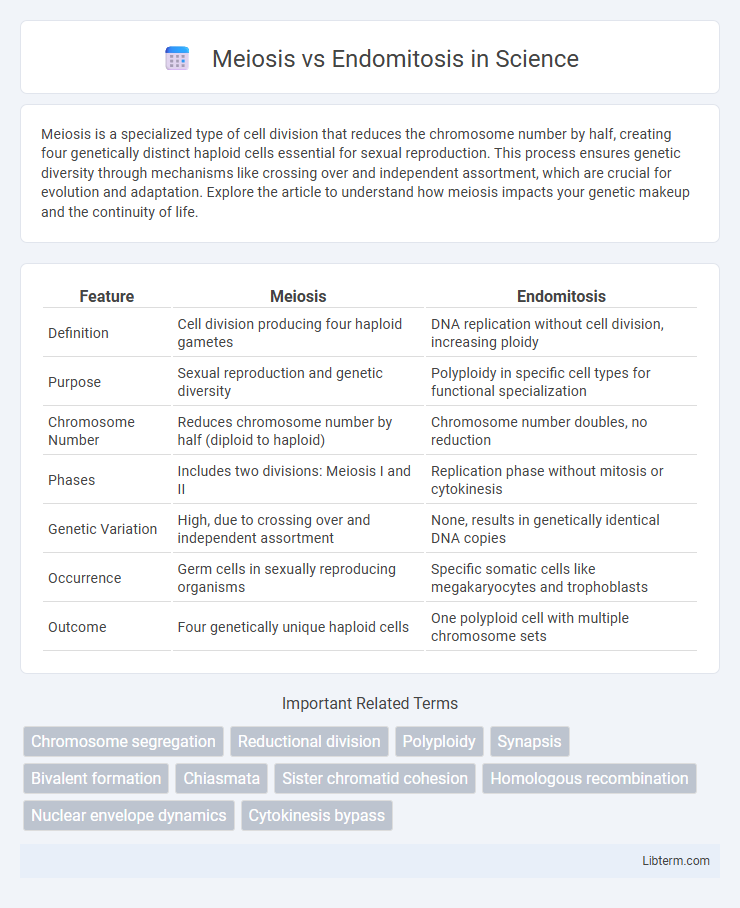Meiosis is a specialized type of cell division that reduces the chromosome number by half, creating four genetically distinct haploid cells essential for sexual reproduction. This process ensures genetic diversity through mechanisms like crossing over and independent assortment, which are crucial for evolution and adaptation. Explore the article to understand how meiosis impacts your genetic makeup and the continuity of life.
Table of Comparison
| Feature | Meiosis | Endomitosis |
|---|---|---|
| Definition | Cell division producing four haploid gametes | DNA replication without cell division, increasing ploidy |
| Purpose | Sexual reproduction and genetic diversity | Polyploidy in specific cell types for functional specialization |
| Chromosome Number | Reduces chromosome number by half (diploid to haploid) | Chromosome number doubles, no reduction |
| Phases | Includes two divisions: Meiosis I and II | Replication phase without mitosis or cytokinesis |
| Genetic Variation | High, due to crossing over and independent assortment | None, results in genetically identical DNA copies |
| Occurrence | Germ cells in sexually reproducing organisms | Specific somatic cells like megakaryocytes and trophoblasts |
| Outcome | Four genetically unique haploid cells | One polyploid cell with multiple chromosome sets |
Introduction to Meiosis and Endomitosis
Meiosis is a specialized form of cell division that reduces the chromosome number by half, producing four genetically distinct haploid cells essential for sexual reproduction. Endomitosis involves DNA replication without cell division, leading to polyploid cells with multiple chromosome sets within a single nucleus, commonly observed in certain tissues like megakaryocytes. Both processes differ fundamentally in their outcomes and biological significance, with meiosis ensuring genetic diversity and endomitosis contributing to cell size increase and specialized functions.
Definition and Overview
Meiosis is a type of cell division that reduces the chromosome number by half, producing four genetically diverse haploid cells essential for sexual reproduction. Endomitosis is a modified cell cycle where DNA replication occurs without nuclear division or cytokinesis, resulting in polyploid cells with multiple chromosome sets within a single nucleus. These processes differ significantly in their mechanisms and biological outcomes, with meiosis contributing to genetic diversity and endomitosis supporting cell enlargement and specialized functions.
Key Stages of Meiosis
Meiosis consists of two consecutive divisions: Meiosis I and Meiosis II, each with distinct stages--prophase, metaphase, anaphase, and telophase. During prophase I, homologous chromosomes pair and undergo crossing over, crucial for genetic recombination. Endomitosis differs as it involves chromosome replication without cell division, leading to polyploid cells, lacking the key stages and genetic shuffling seen in meiosis.
Key Stages of Endomitosis
Endomitosis involves the replication of chromosomes without subsequent cell division, resulting in polyploid cells, which distinguishes it from meiosis that includes two rounds of division to produce haploid gametes. The key stages of endomitosis include DNA replication during interphase, chromosome condensation without nuclear envelope breakdown, followed by chromosome segregation without cytokinesis. This process leads to cells with duplicated chromosomes housed within a single nucleus, crucial in the development of megakaryocytes and certain liver cells.
Chromosomal Changes in Each Process
Meiosis involves two sequential divisions resulting in four haploid cells with half the original chromosome number, characterized by homologous chromosome pairing, crossing over during prophase I, and segregation of homologs in anaphase I, followed by separation of sister chromatids in anaphase II. Endomitosis is a modified cell cycle where DNA replication occurs without subsequent chromosome segregation or cytokinesis, leading to polyploid cells with duplicated chromosome sets remaining within a single nucleus. Chromosomal changes in meiosis promote genetic diversity and reduction of chromosome number, whereas endomitosis increases chromosome content without altering genetic recombination or number.
Biological Significance and Functions
Meiosis produces haploid gametes essential for sexual reproduction, ensuring genetic diversity through homologous chromosome recombination and reduction division. Endomitosis results in polyploid cells by repeated DNA replication without cell division, playing critical roles in cell differentiation and specialized tissue functions such as in megakaryocytes for platelet production. These distinct processes highlight meiosis's role in heredity and endomitosis's contribution to cellular function and organismal development.
Occurrence in Organisms
Meiosis occurs primarily in sexually reproducing organisms, facilitating genetic diversity through the formation of haploid gametes in animals, plants, and fungi. Endomitosis takes place in specific cells of certain organisms, such as megakaryocytes in humans, where DNA replication happens without cell division, leading to polyploidy. While meiosis is essential for sexual reproduction, endomitosis supports specialized cellular functions and development in multicellular organisms.
Genetic Variation: Meiosis vs Endomitosis
Meiosis generates genetic variation through the processes of crossing over and independent assortment, resulting in genetically diverse haploid gametes. Endomitosis, involving chromosome duplication without cell division, typically produces polyploid cells without introducing genetic recombination, thus limiting genetic variation. This fundamental difference makes meiosis essential for sexual reproduction and evolutionary adaptation, while endomitosis primarily contributes to cellular functions such as tissue development and regeneration.
Advantages and Disadvantages
Meiosis generates genetic diversity through recombination and reduces chromosome number by half, essential for sexual reproduction, but it is time-consuming and error-prone, potentially leading to genetic disorders. Endomitosis allows rapid cell growth and increased cell size by replicating DNA without cell division, beneficial in specialized tissues like megakaryocytes, yet it can result in polyploidy, which may disrupt normal cell function and genomic stability. Both processes have unique advantages and limitations depending on the biological context and cellular requirements.
Summary Table: Meiosis vs Endomitosis
Meiosis involves two successive cell divisions resulting in four haploid daughter cells with genetic recombination, essential for sexual reproduction. Endomitosis is a modified cell cycle where DNA replicates without cell division, producing polyploid cells with multiple chromosome sets, common in megakaryocytes. Key differences include chromosome number reduction in meiosis versus chromosome number doubling without division in endomitosis, with meiosis promoting genetic diversity and endomitosis enhancing cellular function through increased gene copies.
Meiosis Infographic

 libterm.com
libterm.com